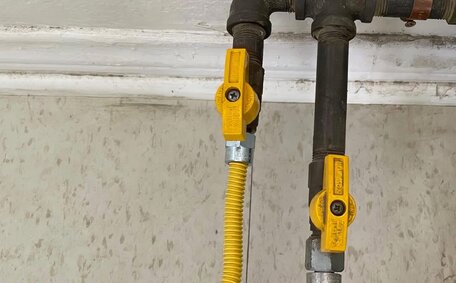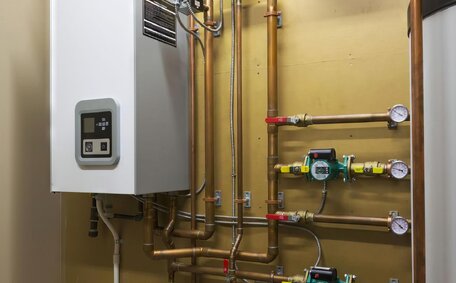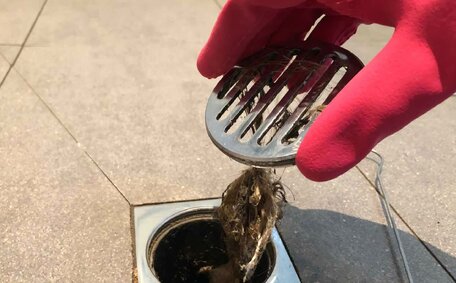Gradual deterioration leads to serious pipe damage over time
Ignoring minor cracks or leaks in pipes can escalate to significant problems if not addressed.
A small crack or defect near a pipe joint can slowly deteriorate, potentially over months or years. As the crack expands, it leads to repeated drain blockages and Water also begins to infiltrate surrounding soil, which can attract termites and create an environment conducive to tree root invasion.
Gradual wear also affects hot water drainage, evident in the reduced flow rate even without obvious blockages. If neglected, ongoing damage necessitates full pipe replacement - a costly and intrusive approach compared to early pipe relining. Prompt action preserves pipe integrity, avoids excavation, and curbs escalating costs.
Cracks or loose pipe joints may also allow foul gases from sewer pipes to permeate your home.
Recurring blockages indicate the need for professional inspection
Chronic blockages, especially in drainage pipes, signal deeper issues that necessitate professional evaluation and repair. Statistics reveal that tree root invasion is one of the most persistent problems, gradually infiltrating cracks over time until severe obstructions occur.
Left unchecked, larger woody roots take hold, embedding themselves firmly in cracks and joints. Without corrective measures, root intrusions intensify, obstructing water passage and resulting in full-scale drain blockages.
Apart from blockages, damage to stormwater pipes can lead to root infestations and termite-attracting conditions in the surrounding soil. If you’re facing recurrent blockages, seek advice on pipe relining from a professional who can also provide a comprehensive pipe inspection. Timely repair intervention via some pipe relining can take care of preserving the integrity of the damaged pipe before an extensive replacement is required.
Soil destabilisation from ongoing pipe erosion can cause wall fissures.
Moist environments from leaks raise termite infestation risks
Neglected cracks and leaks in drainage pipes create ideal moist conditions for termite infestations. As water permeates the surrounding soil over time, colonies of the destructive insects take hold, attracted by the dampness.
Persistent moisture from pipe leaks can decay wood and promote more termite activity. Extensive repairs, costing more than tens of thousands of dollars, often become necessary if infestations are advanced.
Catching minor leaks in damaged pipes early is vital; Promptly calling in plumbing specialists can avert termite damage before minor cracks escalate to serious infestations. Quick measures such as trenchless pipe relining by experts can forestall extensive property rebuilds and high-cost replacements.
Hidden leaks can cause extensive property damage
Undetected leaks from cracked drainage pipes can result in significant property damage over time. Cracked foundations and warped walls may emerge quickly, requiring costly, extensive repairs.
Soil erosion and instability often result from rapid water leakage at pipe joints.
Catching minor pipe leaks early, precisely when they can used to your advantage and are easiest to address, is crucial to avoid exponential deterioration. As drainage efficiency deteriorates, the risk of flooding grows.
Water ingress through small cracks can be prevented by a quick response from a proficient team. Slow seepage rots structures and drains soil stability until fences tilt, pathways sink and buildings are impacted.
Don’t wait until major reconstruction costs have turned up in time due to leakages before having plumbing your sewer storm water system professionally assessed.
Preserve your plumbing system’s integrity with immediate leak detection and consider endorsing the competent team.
Signs that pipe relining is urgently needed
Key signs signalling the urgency for pipe relining include:
- Visible cracks or leaks in your damaged pipes
- Recurrent blocked drains
- Noticeably sluggish flow in your drains
- Musty sewage smells inside your home
- Stains or moisture on walls and floors
- Tilting fences, cracking paths or foundations
- Recent termite inspection discoveries
- Increasingly expensive water bills
Avoid neglecting these warning signs; Instead, make sure to perform regular monitoring and upkeep of your pipes.
The gradual damage will only worsen over time, causing major headaches. Early intervention with trenchless pipe relining seals damaged drainage and prevents any future issues before more extensive pipe replacement is required, so get your pipes checked at the earliest sign of trouble. Take action now to prevent spiralling costs and property damage; our customers express satisfaction with this proactive approach.
The trenchless pipe relining process explained
Trenchless pipe lining is a minimally invasive method that renews worn sections of piping without having to dig up your landscape. This technique involves fitting a superior epoxy resin liner into the pipe, which then solidifies, creating a smooth, waterproof barrier.
Here is an overview of the key steps involved in trenchless pipe relining:
1. Pipe Assessment
First, the pipes are thoroughly inspected using CCTV cameras to identify any cracks, root ingress or other defects, Precise measurements for the custom liner ensure a perfect, seamless fit during installation.
2. Pipe Cleaning
High-pressure jets thoroughly clean the interior of pipes, removing debris and obstacles before liner insertion.
3. Resin Liner Installation
A resin-saturated liner is then introduced and extended within the prepared pipe, bonding to the interior surfaces and quickly hardening.
4. Service Reconnection
Specialists promptly reinstate household lateral connections using remote-controlled robotic cutters, ensuring no interruption to drainage service.
Jannali Plumbing’s trenchless pipe relining delivers significant benefits highly praised for professionalism, such as:
- Trenchless relining eliminates the need for excavation, safeguarding floors, gardens, and driveways, and the area is neatly restored post-service.
- Swift one-day pipe restoration minimises disturbance to your property.
- The structural epoxy lining has a durability of over 50 years.
- This method prevents roots penetration, seals leaks, and restores the pipe’s flow capacity.
- It is a cost-effective alternative to complete drain repair replacements.
Avoid delaying the relining of aging drains - contact us for clarification on the trenchless process or to request an obligation-free quote.
Risks of delaying drainage repairs
Delaying essential drainage repairs poses a serious risk of long-term damage; our expert team is prepared to promptly address such issues. As cracks and defects continue unchecked, the damage your plumbing endures can more easily lead to:
- Structural damage stemming from compromised water drainage can destabilize foundations.
- Corrosion and cracks that worsen over time can lead to tree root infiltration.
- There’s an increased risk of sewer pipe overflow with diminished drainage capacity.
- Unpleasant odours can infiltrate your home from damaged sewer lines.
- Negligence can result in the invalidation of building insurance coverage.
- The complexity of remediation increases costs exponentially.
- Sewage contamination of soil or water pipes poses severe health hazards.
Avoid complacency with plumbing issues; it’s wiser to act swiftly to prevent major future problems. Neglecting minor pipe issues today can escalate into costly emergencies tomorrow. Pipe relining is an affordable, non-disruptive option to restore drainage before drastic measures are needed.
Contact Jannali Plumbing promptly to explore your options. With professional service, you can prevent extensive damage to your plumbing system.






